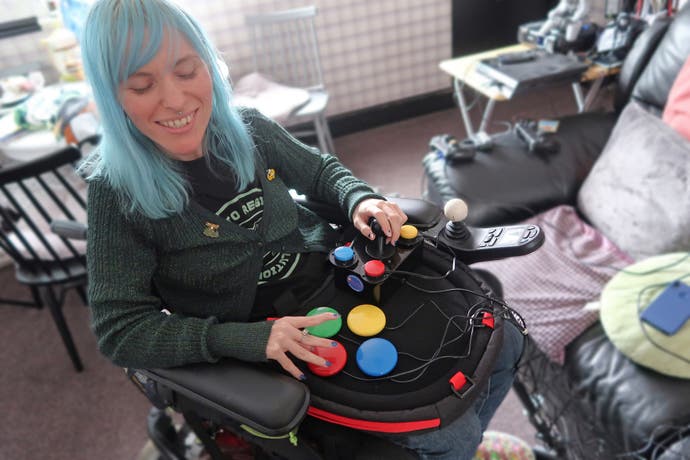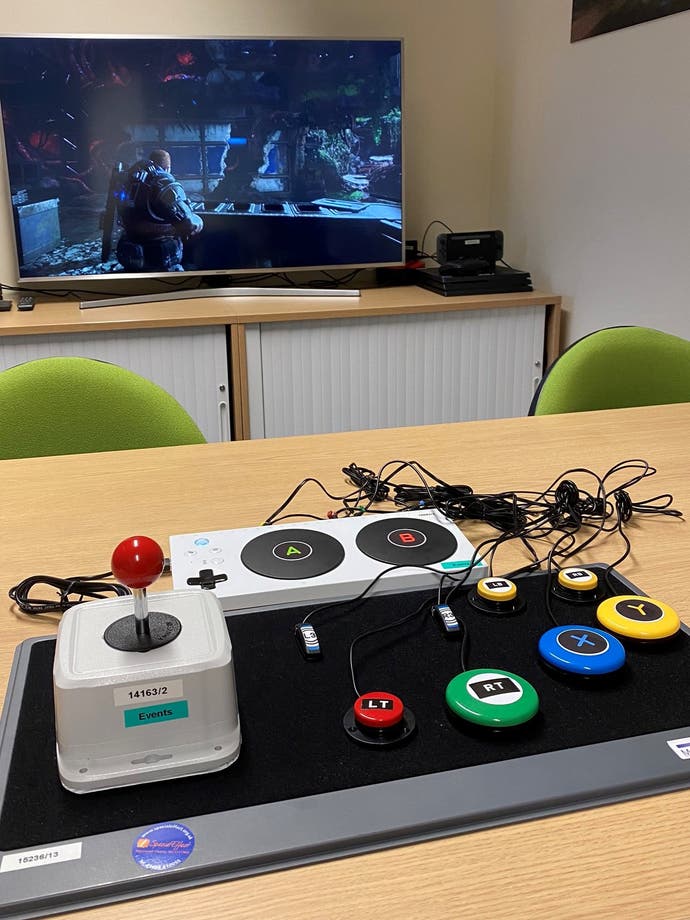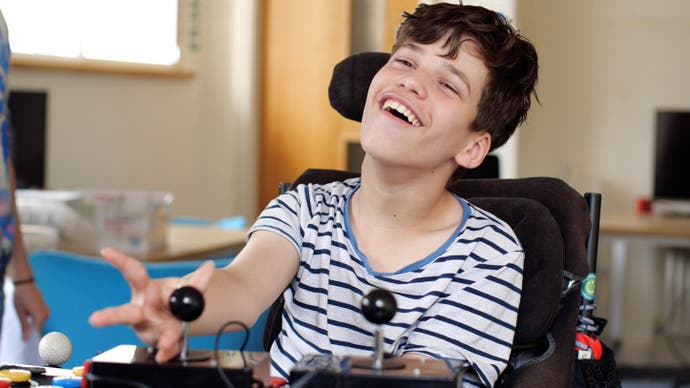The accessibility charity helping Xbox and PlayStation: SpecialEffect
"I realised how absolutely crucial it is for a child to be able to play."
"A lot of the people we work with have had a lifetime of not being able to do things that they're capable of doing, that they want to do and they're seeing their brother and sister do, and they're seeing all their mates do, but they're unable to actually join in. A lot of people come to us like that, and a lot of them have actually given up all hope. Their self image, basically, is of somebody who says, 'I can't do this.' And it's been going on for years.
"It's that moment when, for the first time, they're actually able to play a game that they want to play for the first time; that moment. And you can see it on their face: it's the moment when it changes - that their self image changes from 'I can't do this' to 'I got this'. It's that moment. It's like you've helped them open the doors to this wonderful world of gaming, having just been looking in through the window for years and years and years."
Those are the words of Dr Mick Donegan, founder and CEO of UK charity SpecialEffect. It's a name you might not recognise but you will see it - and him - if you watch the PlayStation accessibility controller video again, and you will see it quoted if you look back at the Xbox Adaptive Controller announcement again. And you'll see his name because SpecialEffect was influential in the creation of both devices - devices that represent colossal milestones for better accessibility in and around games.
For 15 years, Mick Donegan and team have been quietly helping one individual after another with physical challenges find a way to play games. Whether they are born with those disabilities or have a sudden accident, or a progressive disease, SpecialEffect works with the movement they have to find ways they can interact with, and control, games.
"You started a charity to help people play video games?"people would ask Donegan when he began, in 2007 - an age ago in terms of society's general acceptance of video games. "I thought video games were bad for you. You want to start a charity that's going to help people with disabilities do something all the papers are telling us is the work of the devil?"
But playing games was something people had been asking him about enabling for years. Donegan had worked around young people and assistive technology for a long time before SpecialEffect, you see, and parents would always, inevitably, say, "Well that's great that you're helping them to access their learning; great you can give them access to communication if they can't speak; but what can they do when they get home at half-past three? How can they have downtime?"
Without play, there's a fundamental absence in their life. As Donegan says, "They've never played with their brother or sister - ever. And you know what kids are like, siblings: they just want to compete with each other, have a reason to communicate, have a context within which they can communicate and interact with each other."
"We had this email telling us that he thrashed his brother five-one at FIFA. And he said, 'Thank you for giving me my life back.'"
He wasn't sure, though, what to say - he didn't have the answer. "Actually, I didn't have a clue," he corrects me. Nor was he sure where to turn to for help. "I realised that there's nowhere to send these young people," he says. "But I also realised, as someone with a background in education, how absolutely crucial it is for a child to be able to play."
So he did the only thing he could think of at the time: he did it himself. "I just thought, 'Well, I'll carry on doing my own job - I was doing two jobs at the time - but I'll also, in my own time, start up this charity. And if what we achieve, if what we do - if what we discover - [is] perceived as being of any interest or value to either the games industry, or games themselves, then they'll want to support it. And ultimately, they may even want to collaborate with us, the developers, so that we can work together to make games more accessible for everybody.
"That was the idea," he smiles. "It was just me chucking myself in the deep end and giving it a go."
What SpecialEffect does varies with every individual they work with. No two people's challenges are the same and no two solutions are the same. Moreover, the conditions people live with often change. Some may recover mobility through rehabilitation, in the case of an accident, or get weaker in the case of a progressive disease. This means solutions need to change too, "which is why," Donegan says, "with everyone we work with, we offer lifelong support".
Donegan's personal area of expertise is gaze-tracking, which he's a respected authority on. Given that, he tends to be the person SpecialEffect sends to work with people in intensive care, who sometimes only have eye movement available to them. "When you're lying in bed," he says, "whatever is happening to you physically, psychologically you are staring at the ceiling. You might not see a visitor for the best part of the day or even longer. So to actually be able to engage, enjoy, take control, is really important."
Telling me that reminds him of a scaffolder he was working with, who had been electrocuted when a pole touched an overhead cable. Because of the burns associated with the injury, the scaffolder was kept in a special part of intensive care that had restrictions on people coming in, for infection reasons. "So he couldn't see his wife, couldn't see his kids," Donegan says. "And he was just desperate to be able to communicate with his wife. So in his case, the most important thing at the time was to be able to send an email to his wife.
"And you're talking about these moments," he adds. "It wasn't a gaming moment but it was that moment when we set him up with [gaze tracking] and he started to write this email, and it started off, 'My dearest darling...' And that... We went to pieces and left him to it."
That scaffolder then moved into rehabilitation, which is a point where gaming often comes in, and when Donegan tends to hand over to colleagues who know more about gaming than him - "gaze-controlled Peggle is about my limit!" One of these people is his son, Bill Donegan, who's been with him on the SpecialEffect journey since the beginning.
In the scaffolder's case, rehab came with a desire to play football again - he'd been a keen player before the accident - and to play with his kids again. The damage to his legs meant real football was still out of the question, so he was "desperate" to play FIFA in its place. "So we set him up with a way to be able to play FIFA, and by that time, his forearms had healed up well enough for him to control a couple of joysticks and some buttons, and so he's able to play these kids again," Donegan says. "So these are journeys that we're on.
These journeys are long. They span many consultations and involve hours of design work, thought and bespoke equipment to be made. That all means money. And when you think about how specialised the devices can sometimes be, usually one-offs, it's no surprise some cost as much as several hundred pounds. This is one of the reasons the comparatively mass-produced Xbox Adaptive Controller and PlayStation accessibility controller are so important: for keeping costs down.
But SpecialEffect never asks for a penny, and this is a founding principle for the charity. The idea has always been to do what they do for free, and then provide the equipment on a long-term loan basis. And then, if at some point the person they're helping likes and wants to buy similar equipment of their own, they can, and they can return the loaned equipment to SpecialEffect. "But that's not compulsory."
On top of that, SpecialEffect also decided it never wanted to ask people for money, which sounds counterintuitive for charity, and certainly baffled business people early on. But the intention was always - as mentioned at the beginning of the piece - to do something well and let people come to SpecialEffect. In other words, to let the stories speak for themselves.
Stories like, for example, John's. He has muscular dystrophy so SpecialEffect modified a controller for him, making it lighter and the buttons and sticks easier to move and press. "And he used to say how great it was to get online and nobody knew that he had a disability, because he was anonymous," Donegan says. "He said, 'You're treated equally because they don't see the disability, they see the gamer.'"
Or the story of Tom, who had a progressive condition too. "We helped him play FIFA for the first time in 15 years against his brother, who's 25," Donegan says. He hadn't been able to play either real football, which he started to play with his brother when he was younger, nor play FIFA for fifteen years. We set him up [...] and he beat his brother five-one. We had this email telling us that he thrashed his brother five-one at FIFA. And he said, 'Thank you for giving me my life back.'"
Or the story of accessibility consultant and Eurogamer contributor Vivek Gohill, who I've talked to in a podcast episode of his own.

It's stories like these that convince people to help SpecialEffect. They're shared online or in person at events like EGX. Donegan remembers how one man came to the EGX stand years ago, received a demonstration, and then announced, "Do you know, I'm ashamed to say I've never ever helped a charity before in my life. But this is my charity," and decided to support it from thereon.
It's how SpecialEffect has not only managed to keep helping people for 15 years, but how it has grown to 30 people and attracted gaming mega-corps like Xbox and PlayStation. "And it's lovely that people are coming to us now because they feel that we're worth talking to and worth listening to," Donegan says.
But the point has never been individual success; the point has always been collective change, and SpecialEffect being a catalyst for that. That's why SpecialEffect made its new DevKit tool, a culmination of 15 years' work, freely available to anyone wanting to make their games more accessible. It's why it freely shares videos online instructing people on the best accessibility options in games.
"So the whole idea is to share it," Donegan says. "I don't want to take over the planet planting SpecialEffects all over the place - no! I just want to focus on what we're doing and to collaborate with developers whose aims resonate with our own."
"I'd like to think that we've just been a bit of a catalyst to that gradual change"
We've seen a huge step-change in recent years in accessibility in games - the Xbox Adaptive Controller and PlayStation accessibility controller are shining examples of this. But we're also seeing more customisation options in the games themselves, particularly in first-party Sony and Microsoft games.
It all lightens the burden on SpecialEffect to build custom equipment and create custom scripts for the people it works with to be able to play games.
The tide is, undeniably, turning. There's more awareness now, Donegan believes, and he thinks people aren't as afraid of putting it in their games - they know it's not "rocket science". They're also beginning to open their eyes to the commercial benefits of better accessibility. After all, "Do you want to sell more games or don't you?"
"And I'd like to think that we've just been a bit of a catalyst to that gradual change," he says. "I've always wanted it to be like a movement and that's how it feels. [...] We're just one of those organisations who are a movement towards greater accessibility."

But there's still work to do. "Games could be a lot more accessible," he says. And the example he uses is gaze-tracking. "PCs have been gaze-accessible since the 80s, if not before, whereas consoles still aren't gaze-accessible," he says. He worked out, quite roughly, that as many as 40 million people could have their gaming improved by using gaze-tracking, either on its own or in conjunction with other devices. "What I'm saying is that is with just one access method. So in other words, the job is far from done even in relation to just that one device."
Dongean would also love to see more variation in gamepad controllers. "At the moment, you've got one size, one force fits all with a gamepad," he says. "Whereas, one of the things it'd be lovely to see is to have different pressures of gamepad, or an adjustable pressure gamepad, so as people, if they've got a progressive condition where they're getting weaker, they can still be able to play."
Mick Donegan was awarded an MBE last year for the work he's done. It's the sort of award I imagine him being self-conscious about, because I don't think he likes the limelight or being singled out. Typically, he puts other people's achievements at SpecialEffect above his own.
However, the MBE did represent something special to him beyond personal recognition. It was validation that what he had embarked on all those years ago amounted to something, as obvious as that might seem to you or me, looking in.
"I took it as an endorsement of video games and of what we were doing," he says, "what the charity was set up to do: to help people with disabilities play video games. That was acknowledged as being something that is worthwhile."
Undeniably, it is.
If you are someone who has physical challenges and would like to find a way to play games, Donegan urges you to get in touch via the SpecialEffect website. He also suggests checking the GameAccess archive for tips on accessibility options in games.
If you're a developer looking for help making your game more accessible, check out the SpecialEffect DevKit. It's free.



